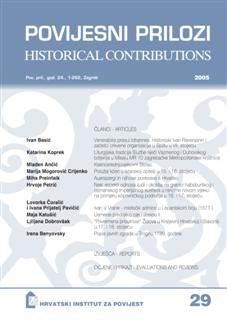Liturgijska tradicija Službe riječi Vazmenog i Duhovskog bdijenja u Misalu MR 70 zagrebačke Metropolitanske knjižnice
Liturgical tradition of Service of the Word in Easter and Pentecost Vigils of the Missal MR 70 of the Zagreb Metropolitan library
Author(s): Katarina KoprekSubject(s): History
Published by: Hrvatski institut za povijest
Keywords: liturgical tradition; medieval liturgical practice; medieval liturgical flexibility; missal; chants; Easter Vigil; Pentecost Vigil
Summary/Abstract: Easter and Pentecost Vigils that form the Zagreb missal from the 13th century under call number MR70 compared to the other missals from the Zagreb Metropolitan library. Based on the recent research by Hana Breko, missal MR70 was created in the enclave of the Salzburg archbishopric on the medieval Slovenian territory. In this study, we would like to explore different influences by comparing the composition of the key elements of these vigils: the Service of the Word and chants, since the church centers in Salzburg might have influenced the liturgical organization of Zagreb Cathedral and presented the possible redaction model for the missals created in Zagreb scriptorium. Comparative analysis shows that MR 70 and the missals created in Zagreb scriptorium do not follow the same liturgical tradition in composition of the Service of the Word and the chants of the Easter Vigil. These differences can be clarified by geographical and historical positioning of the missal MR 70 and Zagreb missals which, in their liturgical composition, bring traces of influences and origin from northern France through Hungary. Codex MR 70 bears witness to the historical development (stage) within the medieval structuring of the Easter and Pentecost Vigils. It differs from the missals created in Zagreb scriptorium and it, in that sense, represents a valuable example from the Zagreb Metropolitan library. By following the internal “speech” of missal MR70 and other Zagreb missals, we face the difficulty that arises from the internal structure of the mentioned manuscripts, that is, from the fact that there is a liturgical element that can be observed outside the liturgical structures of that time. The medieval liturgical flexibility had an exceptional sense for liturgical adaptation to the tradition of that time which is corroborated by the missal MR70 in its musical, historical and liturgical structures, as well as in the nature of the medieval liturgical practice and its use in medieval Zagreb.
Journal: Povijesni prilozi
- Issue Year: 2005
- Issue No: 29
- Page Range: 29-40
- Page Count: 12
- Language: Croatian

